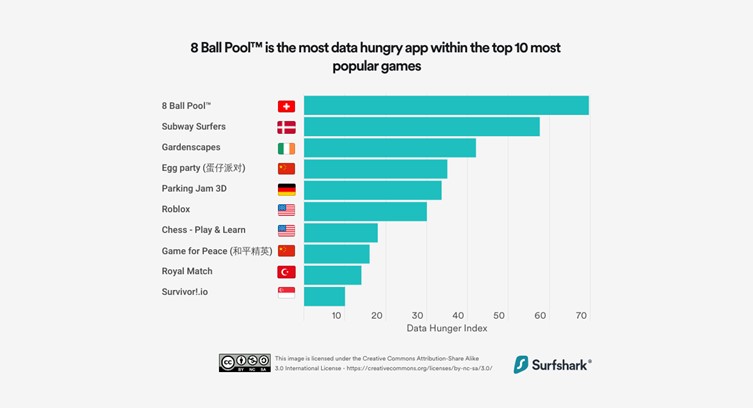Surfshark last Monday released findings that ranked the most popular mobile games based on a data-hungriness index, allocating points depending on data collected and its sensitivity. In Brazil, the most popular apps, Hay Day and Free Fire, are ranked 17th and 14th based on data hungriness. Notably, both Hay Day and Free Fire gather a greater number of data points compared to the average 9.2, including contact information, location data, and contacts. Hay Day uses user data for third-party advertising.
Additionally, the study identified Call of Duty®: Mobile, Candy Crush Saga, and 8 Ball Pool™ as the top three worst gaming apps for privacy, collecting up to 17 out of 32 different data points, including photos and videos, contact information, location data, contacts. Out of the 49 mobile gaming apps popular in Brazil, 37 of them employ or share users' data for third-party advertising purposes.
Out of the total 510 most popular games across 60 countries, 492 collect user data, and 446 allow tracking across other companies’ apps and websites. The data-hunger scores of apps in Canada, Germany, Australia, the United States, and Hungary are more than 10% higher than the total average. Canada’s most popular gaming apps are the most privacy-invasive.
The top 10 games have a 21% higher index than the total average in the dataset. 8 Ball PoolTM is the most data-hungry app among the top 10 apps globally (159% higher than the average game in our dataset), followed by Subway Surfers (114% higher) and Gardenscapes (56% higher).
Some apps collect data beyond what is commonly accessed. For example, Roblox collects the highest variety of data categories, including a user's search history — a data point not collected by any other game in the global top 10. Chess — Play & Learn collects browsing history, while 8 Ball Pool™ accesses user's contacts.
Sources:
- https://surfshark.com/research/study/gaming-apps-data-privacy
- https://docs.google.com/spreadsheets/d/1J9uzoQlerwU8JV2MON1CoumEToEOE_wvxyWzNGwOpt8/edit?usp=sharing
Gabriele Racaityte - Krasauske, a Spokeswoman at Surfshark
A significant number of gamers are unknowingly granting permission to share their personal data, unaware of where it ends up. In our global study of 510 mobile gaming apps, we discovered that the majority use activity tracking across other companies’ apps and websites and could transmit data to third parties, which may include tech companies, advertisers, or data brokers. This data can be exploited for purposes that extend beyond gaming, such as targeted marketing or market research. It is essential to thoroughly investigate before downloading anything on your phone.


















